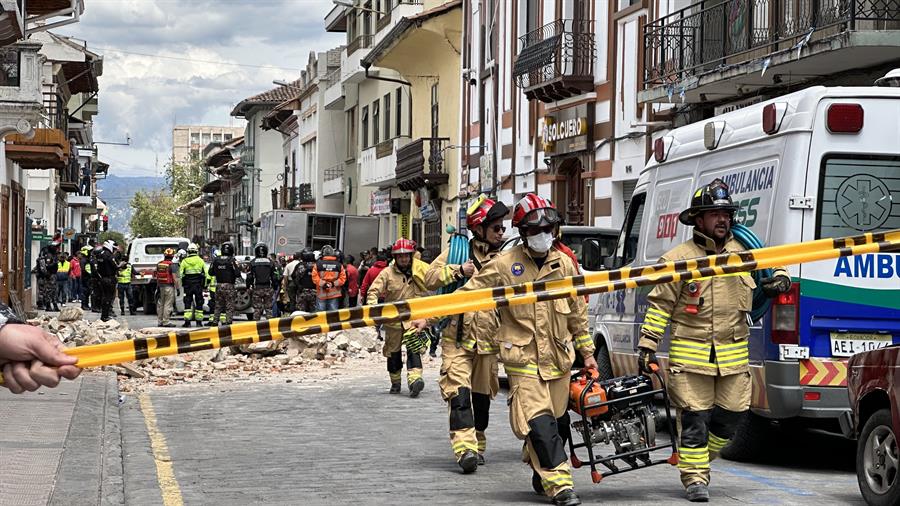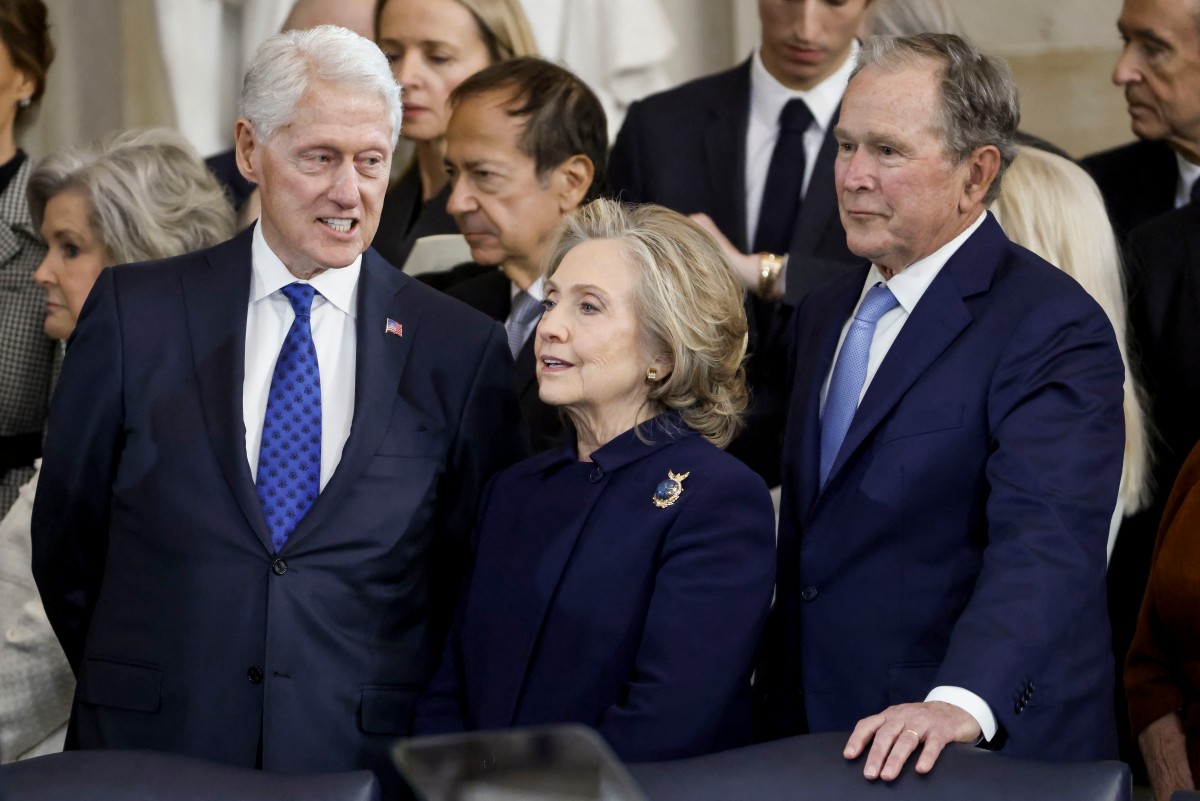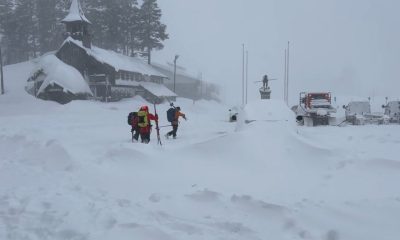International
Ecuador quake leaves 14 dead and more than 400 injured

March 20 |
The strong 6.8 tremor that shook Ecuador left 14 dead and 446 people injured in at least two provinces, the country’s authorities reported on Sunday. At least one death was reported in bordering Peru.
A day after the earthquake, the most recent official reports show that 180 houses were affected and 5 bridges were destroyed, according to the Ecuadorian Risk Management Secretariat.
In Peru, Prime Minister Alberto Otárola reported that a 4-year-old girl died in a hospital in the Tumbes region, bordering Ecuador. The minor suffered an encephalocranial traumatism after her house collapsed due to the earthquake in Ecuador, which was also felt in Peru.
The Peruvian civil defense said that due to the tremor four houses were uninhabitable in the Tumbes region.
Ecuadorian rescue forces are still working in the areas affected by the quake, which according to Ecuador’s Geophysical Institute had its epicenter about 29 kilometers from Balao, in the Guayas region, about 80 kilometers south of Guayaquil, Ecuador’s second largest city.
Early Sunday, rescuers and volunteers traveled to the island of Puná, on Ecuador’s southern coast, to assess damage and offer aid to the victims. President Guillermo Lasso called on Ecuadorians to remain calm and expressed his solidarity with the families of the deceased and those affected.
The expressions of support to the victims and relatives of the victims began to arrive after the earthquake.
Pope Francis offered prayers on Sunday for the victims of the earthquake. During his weekly midday blessing, Francis recalled that the tremor “caused deaths, injuries and enormous damage.”
“I am close to the Ecuadorian people and I assure them of my prayers for the dead and for all those who suffer,” the pope added.
The U.S. ambassador in Quito, Michael J. Fitzpatrick, offered via Twitter “sincere condolences” for the deaths and assured that the U.S. “joins the people of Ecuador in this difficult situation.
Deaths and damages
One of the people who lost his life in Saturday’s earthquake was in the city of Cuenca. The victim was trapped inside a vehicle on which the facade of a house collapsed, informed the Secretariat of Risk Management.
In the province of El Oro, the collapse of a house resulted in the death of three people. In the area of Jambelí, the collapse of the camera tower of the Integrated Security Service ECU 911 was reported.
The airport in the Santa Rosa canton was slightly damaged as a result of the earthquake.
At the moment, two aftershocks have been registered after the tremor. One of magnitude 4.8 at a depth of 24 kilometers, and another of magnitude 3.7 at a depth of 23 kilometers. Both with epicenter about 23 kilometers from Balao, Guayas.
In Guayas, authorities reported multiple material damages. Including the collapse of 10 houses that left several injured.
In Machala canton, the tremor caused the collapse of a two-story house leaving people trapped inside, authorities reported. They also reported the collapse of telephone lines and lack of electricity in several sectors of the province, and the collapse of the old coastal dock.
Firefighters immediately launched rescue efforts for people trapped under the rubble.
President Guillermo Lasso called for calm and to “be informed through official channels”, in a message on his social networks. Lasso said that he communicated with the Secretariat of Risk Management “to evaluate the effects” of the earthquake that occurred in Balao, Guayas.
The president and his cabinet activated the National Emergency Operations Committee in Guayaquil to evaluate the effects caused by the tremor.
International
Federal Judge Blocks Trump Policy Allowing Deportations to Third Countries

A federal judge ruled on Wednesday that the policy of U.S. President Donald Trump’s administration allowing immigration authorities to deport foreign nationals to third countries without prior notice or the opportunity to object is unlawful. The decision marks another legal setback for the administration on immigration matters.
Judge Brian Murphy of the U.S. District Court for the District of Massachusetts struck down the regulation issued last year, which stated that Immigration and Customs Enforcement (ICE) was not required to notify migrants if they were to be sent to countries other than the one listed in their removal order, provided that receiving nations offered assurances they would not face persecution or torture.
Murphy ordered the measure vacated but granted a 15-day delay before the ruling takes effect, giving the Trump administration time to file an appeal.
In his decision, the judge concluded that the policy violates federal immigration law and migrants’ due process rights. He also questioned the lack of transparency surrounding the alleged assurances provided by receiving countries, stating that “no one really knows anything about these supposed ‘assurances.’” He added, “It is not right, and it is not lawful.”
The ruling follows several legal disputes involving deportations to third countries. Last year, the executive branch deported more than 200 Salvadorans to a maximum-security prison in El Salvador, invoking an old wartime law. The White House also held talks with Costa Rica, Panama, and Rwanda about receiving migrants who are not citizens of those countries.
In May, the same judge determined that the government violated a court order when it attempted to remove a group of immigrants with criminal records to South Sudan without prior notice or an opportunity to raise claims of fear of persecution.
Although President Donald Trump took the case to the U.S. Supreme Court, which temporarily allowed the deportations to resume while a final decision was pending, the White House is expected to again appeal to higher courts to overturn this latest judicial ruling.
International
Cocaine Production Surges 34% in 2023 as Market Expands into Africa and Asia

The global cocaine market is the fastest-growing among all illicit drugs worldwide, the International Narcotics Control Board (INCB) warned on Thursday in its annual report presented in Vienna.
The body attributes this expansion to the sustained rise in production in South America — particularly in Colombia — as well as increasing demand in emerging regions such as Africa and Asia.
According to the report, global cocaine production surpassed 3,700 metric tons in 2023, marking a 34% increase compared to 2022. This growth is largely driven by the expansion of illicit coca cultivation in Colombia and the greater production capacity of clandestine laboratories.
The INCB noted that the market has not only grown in volume but has also diversified and become more globalized. While Europe and North America remain the primary destinations, trafficking routes now reach “all regions of the world,” including Africa — traditionally considered a transit zone — and Asia, where the presence of cocaine was previously marginal.
In Western and Central Europe, for the fifth consecutive year, seizures in 2023 exceeded those in North America, consolidating the region as the leading destination market. Between January 2019 and June 2024, more than 1,826 metric tons of drugs bound for European ports were seized, of which 82% was cocaine, equivalent to 1,487 metric tons.
The report also highlights that seizures in Africa rose by 48% in 2023 compared to 2022, reflecting the expansion of the market on the continent. Globally, the number of cocaine users increased from 17 million in 2013 to 25 million in 2023.
International
Clinton Accuses Republican Committee of Using Epstein Case to Shield Trump

Former U.S. Secretary of State and former First Lady Hillary Clinton denied on Thursday before a congressional committee that she had ever met convicted sex offender Jeffrey Epstein in person or had any knowledge of the crimes he committed.
Clinton testified behind closed doors from New York before the House Oversight Committee. The wife of former President Bill Clinton — who is scheduled to testify on Friday — accused the Republican-controlled committee of summoning her in order to “distract attention” and “cover up” the activities of President Donald Trump, who had past ties to Epstein.
“I do not recall ever meeting Mr. Epstein. I never flew on his plane nor visited his island, his homes, or his offices. I have nothing further to add,” she stated.
The former Secretary of State emphasized that she “had no idea about the criminal activities” of the financier, who died in prison in 2019. “Like any decent person, I was horrified when I learned of his crimes,” she said.
Clinton described the Epstein case as “a tragedy” and “a scandal” that deserves “a thorough investigation,” but criticized the committee for failing to summon what she called the truly relevant individuals.
“Instead, you have asked me to testify, knowing that I have no knowledge that would serve your investigation, with the purpose of distracting from President Trump’s activities and shielding him despite the legitimate demand for answers,” she said.
The questioning, conducted behind closed doors in Chappaqua, New York — where the Clintons reside — took place one day before former President Bill Clinton was scheduled to appear at the same location.
Although the Clintons initially declined to testify before Congress, the threat of being held in contempt ultimately led the former presidential couple to agree to appear and explain their relationship with Epstein.
-

 International2 days ago
International2 days agoFamily of “El Mencho” Seeks Return of Body After Deadly Military Operation
-

 International2 days ago
International2 days agoLarry Summers Steps Down from Harvard Role Amid Epstein Controversy
-

 International5 days ago
International5 days agoNinth Victim Recovered After Deadliest U.S. Avalanche in Decades
-

 International2 days ago
International2 days agoIran’s President Optimistic Ahead of Geneva Nuclear Talks with U.S.
-

 International4 days ago
International4 days agoOver 40 Million Affected by Major Snowstorm in Northeastern U.S.
-

 International2 days ago
International2 days agoStephen Hawking Photo Appears in Newly Released Epstein Documents
-

 International2 days ago
International2 days agoBill Gates Admits “Serious Mistake” Over Epstein Ties
-

 International4 days ago
International4 days agoNine People Killed in Two Armed Attacks in Manabí, Ecuador
-

 International11 hours ago
International11 hours agoCocaine Production Surges 34% in 2023 as Market Expands into Africa and Asia
-

 International11 hours ago
International11 hours agoFederal Judge Blocks Trump Policy Allowing Deportations to Third Countries
-

 International11 hours ago
International11 hours agoClinton Accuses Republican Committee of Using Epstein Case to Shield Trump




























